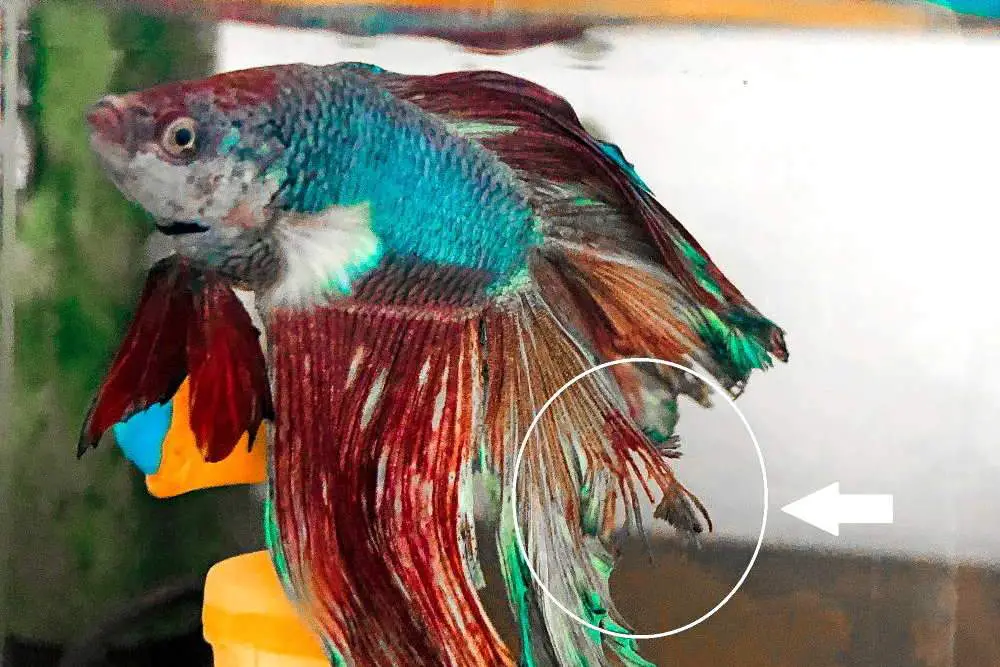Betta fish are one of the most popular fish kept as pets due to their vibrant colors and unique personalities. However, they are prone to a range of health issues, including body rot. Betta fish body rot, also known as fin rot, is a bacterial infection that can cause significant damage to the fish’s fins and body if left untreated.
In this article, we will explore the causes of betta fish body rot, as well as the symptoms and treatment options available. Whether you are a seasoned betta fish owner or new to the hobby, understanding how to prevent and treat body rot is essential for ensuring the health and wellbeing of your fish. So, let’s dive in and learn more about this common betta fish health issue.

Understanding and Treating Betta Fish Body Rot
Betta fish, also known as Siamese fighting fish, are popular pets due to their vibrant colors and active personalities. However, they are susceptible to various diseases, including body rot, which can be fatal if left untreated. In this article, we will discuss what body rot is, its symptoms, causes, and how to treat it.
Symptoms of Body Rot in Betta Fish
Body rot is a bacterial infection that affects the fish’s tissues and can spread quickly if not treated promptly. The most common symptoms of body rot include:
1. Faded colors and loss of appetite
2. Lethargy and sluggish movements
3. Fins and tail thinning or fraying
4. White or gray patches on the skin
5. Reddened or inflamed areas around the affected tissue
If your betta fish shows any of these symptoms, it is essential to act quickly to prevent the disease from spreading.
Causes of Body Rot in Betta Fish
Body rot is caused by various bacterial infections, most commonly Aeromonas and Pseudomonas. Poor water quality and inadequate tank maintenance can create an ideal environment for these bacteria to thrive. Overcrowding, overfeeding, and stressful conditions can also weaken the fish’s immune system and make them more susceptible to infections.
Treating Body Rot in Betta Fish
The first step in treating body rot is to isolate the infected fish and quarantine it in a separate tank. This will prevent the spread of the disease to other fish in the tank. Here are some steps to take to treat body rot:
1. Clean the tank and change the water. Use a water conditioner to remove any chlorine or other harmful chemicals.
2. Treat the water with aquarium salt and a broad-spectrum antibiotic. Follow the instructions on the package for dosage and frequency.
3. Keep the water temperature between 76-82°F and maintain good water quality by performing regular water changes and tank maintenance.
4. Feed your fish a balanced diet and avoid overfeeding.
Benefits of Treating Body Rot in Betta Fish
Treating body rot in betta fish can help improve their overall health and prevent the spread of the disease to other fish in the tank. A healthy betta fish will have vibrant colors, a good appetite, and active behavior. By maintaining good water quality and proper tank maintenance, you can prevent the recurrence of body rot and other bacterial infections.
Vs Other Treatments
There are various treatments available for bacterial infections in betta fish, including medicated fish food, herbal remedies, and chemical treatments. However, these treatments may have side effects and may not be as effective as antibiotics. It is always best to consult with a veterinarian or an experienced fish keeper to determine the best course of treatment for your betta fish.
Conclusion
Body rot is a common bacterial infection that affects betta fish and can be fatal if left untreated. By understanding the symptoms, causes, and treatment options, you can provide your betta fish with the care they need to stay healthy and active. Remember to maintain good water quality, feed a balanced diet, and perform regular tank maintenance to prevent the recurrence of body rot and other bacterial infections.
Frequently Asked Questions
Here are some commonly asked questions about understanding and treating Betta fish body rot.
What is Betta fish body rot?
Betta fish body rot is a bacterial infection that can affect the fins, scales, and body of your Betta fish. It is caused by a number of different bacteria, including Aeromonas and Pseudomonas. This disease is most commonly seen in fish that are kept in poor water conditions or housed with other sick fish.
Early symptoms of Betta fish body rot include fin rot, redness, and inflammation around the affected area. If left untreated, the infection can spread rapidly and cause the fish to become lethargic, lose its appetite, and eventually die.
What are some common causes of Betta fish body rot?
Betta fish body rot is caused by poor water quality, stress, and a weakened immune system. Poor water quality can lead to an increase in harmful bacteria, which can cause infections in fish. Stress can weaken the immune system, making the fish more susceptible to infections. Overcrowding, overfeeding, and an unclean tank can also contribute to the development of Betta fish body rot.
If you notice any signs of Betta fish body rot, it is important to address the underlying cause of the infection in order to prevent it from spreading to other fish in your tank.
How can I treat Betta fish body rot?
The first step in treating Betta fish body rot is to isolate the infected fish in a separate tank or container with clean, warm water. You should also test the water in your main tank for ammonia, nitrite, and nitrate levels, and perform a partial water change if necessary.
There are a number of effective treatments for Betta fish body rot, including antibiotics, salt baths, and herbal remedies. Your veterinarian or local pet store can recommend the best treatment option for your fish based on the severity of the infection.
How can I prevent Betta fish body rot?
The best way to prevent Betta fish body rot is to maintain a clean and healthy environment for your fish. This includes regular water changes, proper filtration, and avoiding overfeeding and overcrowding in your tank. You should also avoid introducing sick or infected fish into your tank, as this can increase the risk of disease transmission.
If you notice any signs of illness in your Betta fish, it is important to take action immediately to prevent the infection from spreading and to ensure the health and well-being of all the fish in your tank.
Can Betta fish body rot be fatal?
Yes, Betta fish body rot can be fatal if left untreated. The infection can progress quickly and cause serious damage to the fish’s scales, fins, and internal organs. In severe cases, the fish may become lethargic, lose its appetite, and eventually die.
If you notice any signs of Betta fish body rot, it is important to take action immediately to isolate the infected fish and begin treatment as soon as possible. With prompt and effective treatment, the vast majority of Betta fish can recover from this infection and return to good health.

Top Tips For Curing Your Sick Betta Fish!
In conclusion, understanding and treating Betta Fish Body Rot is crucial for the health and longevity of your fish. It’s important to recognize the early signs of the disease, such as discoloration or fin rot, and take action immediately. Providing a clean and well-maintained environment, as well as a balanced diet, can go a long way in preventing and treating this condition.
Furthermore, seeking the advice of a veterinarian or experienced fish keeper can be beneficial in determining the best course of action for your Betta Fish. With proper care and attention, your Betta Fish can thrive and live a long, healthy life.
Remember, Betta Fish Body Rot is a preventable and treatable condition. By staying vigilant and providing the necessary care, you can ensure that your fish remains happy and healthy. So, take the time to understand and treat this condition, and enjoy the beauty and companionship of your Betta Fish for years to come.
